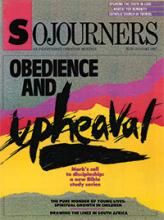I remember the first time I saw you. It was in a dispensary near Sealdah Station, a half-hour tram ride from my room at the YWCA. I was in Calcutta, India, with a group of seminarians volunteering with Mother Teresa's Missionaries of Charity. Three days a week several of us came to Sealdah to boldly offer our ignorance to those seeking some relief from their suffering. Sadly, our ignorance soon became irrelevant as the enormity of Calcutta's grief made itself known.
We were there in that stifling, little low-ceiling compartment that was generously called the dispensary. The iron bars in the few windows gave it the look of a cage, and we Western liberal volunteers were the animals on display. We knew as many came to stare at us as to be treated. Those poor whom we had come to touch for Christ would laugh at us, point out our foolishness, and converse with those Sisters who spoke Bengali. The oppressive heat and noise and the smell of sweat and open sores remain lodged in my memory of that summer in Calcutta.
I guess I had been working there for three or four weeks when you arrived. I thought that by that time I had seen it all, that I'd become objective. At least I hoped I had. That is what hope had become, a silent prayer for an end, not to the irredeemable misery, but to the seeing of it.
Faith had also changed by the time we met. It had faded, gone sour, and remained intact only through witnessing the sheer power of the Sisters' devotion. Your presence would forever shatter that fragile, vicarious faith.
Phiroza, little one, you were five years on this earth but your face was old. You weighed 18 pounds and could barely hold your head upright, a head obscenely large on your wasted body. Your mother brought you. She seemed to know there was no help for you. But she brought you. The volunteer physician simply shook her head and returned you to your mother's arms. There was no help, no help for you.
Read the Full Article

